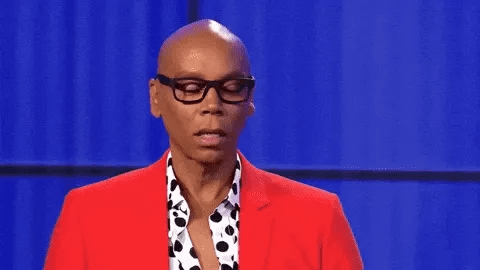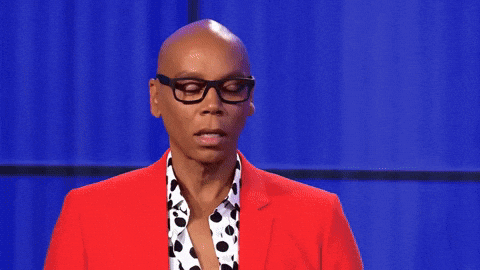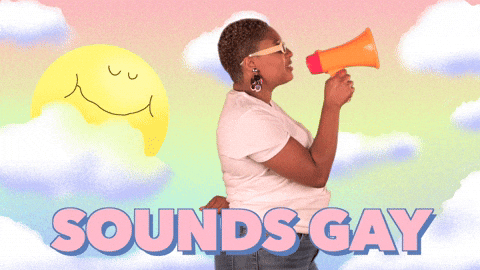Have you ever heard someone speak and immediately wonder if they’re a friend of Dorothy? That’s ‘gay voice’; it’s a thing. It doesn’t have to be overly-dramatic, like Jack on Will & Grace, even minor voice inflections can give off a gay vibe from those in the skittles community.
Some people may associate ‘gay voice’ with over-the-top expressions like ‘Yass’ and ‘Slay!’, but ‘gay voice’ isn’t just a cultural phenomenon in sociophonetics. There’s a scientific basis to what we’re hearing, and it’s often used as a sound-based detector, ‘gaydar’.
That’s right, gaydar is a scientific process. A Doppler for drag, if you will.
‘Gay voice’ is sometimes referred to as a gay accent; however, there are vast variances between individuals because the gay community isn’t a monolith. The below will discuss common aspects of it that can vary greatly between individuals, but that together form the gay sociolect.
For this piece, we’ll look specifically into the gay male voice as it is the most pronounced and recognizable. However, lez be honest, there are other versions, such as ‘lesbian voice’.
Originally, the phenomenon was considered simply as an ‘effeminate’ way of speaking. But it’s a culturally-engrained way of speaking, in a nurture-over-nature way. People studying ‘gay voice’ originally suspected that it could be derived from gay men hanging out with more women than straight men.
However, while gay men may use a few stereotypically female features of speech— ‘gay voice’ has characteristics not commonly found in the female lexicon.
So, having a voice that’s too glam to give a damn isn’t effeminate.
Women often speak with a higher pitch than their male counterparts — but gays take the proverbial cake; they have more range and pitch variation than average men or women. They speak the rainbow in a sense. In a single sentence, some can go from a Barry White-esque bass-baritone all the way up to a Mariah-Carey-esque high note. Manilow to Mariah.
But as my Senior Gay Correspondent,
, notes, gay voices can lean towards the higher end of the register than many straight males:“Growing up, I was often mistaken for a female when people called our house. Even after puberty, my voice wasn’t as deep as other guys. I think my “gay voice” contributes to the stereotypical signs that people associate with us, like talking with our hands, the “limp wrist,” constant eyerolls, a sashaying walk — all of which I have.”
Characteristic pitch used in ‘gay voice’ can be higher, but it’s much more varied than their straightie counterparts. Their range and use of inflection for effect can give their cadence a more melodic flow, which is a commonly recognized sound of ‘gay voice’. But pitch alone doesn’t do the term justice.
There are two vocal devices commonly used in the queer community: uptalk and vocal fry.
Uptalk, also known as rising inflection and high-rising intonation, is a way of speaking in declarative sentences but with an intonational rise at the end, as if they were questions. Australians commonly use rising inflection in their speaking, something that Aussie comedian Adam Hills has made jokes about, that they’re too insecure to actually make a statement.
Another commonly used phonation in the gay community that says ‘Oh deer, I’m queer’ is vocal fry.
Vocal Fry is used at the end of sentences, similar to uptalk. It’s one of the lowest vocal registers and is characterized by a deep, creaky, breathy, or rattling sound. It happens by loosely closing the vocal cords and allowing air to slowly bubble through. One of the most famous examples of its use is with the Kardashians. It’s also popular with millennials and Gen Z, although no matter who uses it, it is often seen as a negative attribute of speech.
‘Gay voice’’ goes even farther beyond pitch, uptalk and fry. Those with glitterized vocal cords tend to have longer durations for vowels and sibilants. Vowel durations for a, i, and u, in particular, are longer than we typically see in straight males.
In gay voice, sibilants like the letters and sounds ‘s’, ‘z’, “sh”, and “zh” have greater stridency and duration, creating a hissing-type sound. This is otherwise known as the ‘gay lisp’.
To envision the gay lisp, if you aren’t familiar, think: ‘Yasss Queen’
The ‘gay lisp’ can be contentious, as gay men are no more likely to have a lisp than straight men. Due to its notoriety and recognizability, it’s also one of the ‘gay voice’ characteristics that many hide, or try to train their voice out of.
It also isn’t technically a lisp.
A lisp occurs when you misarticulate your ‘sth’ sound, but in ‘gay voice’ it’s technically an over-articulation of the ‘sss’ sound.
In fact, overarticulation is a big part of gay speech patterns. They tend to articulate their words significantly better than their straight counterparts. Any parent of a straight teenage boy is probably shaking their head right now, having spent an abundant amount of time translating teenage mumbles and grunts.
Do gay men’s better articulation and more varied range make them better than us?
Yeah, probably.
Technically speaking, their often crystal-clear pronunciation and ability to use varied pitch can make them extremely eloquent speakers. It can also lead to a more stunning singing voice; however, that might be a chicken-egg scenario in terms of gay men and the arts.
Back in the 1970s, scientists studying all the above initially thought that there may have been hormonal differences causing queer men to sparkle-up their language. But gay men, of course, have the same amount of testosterone as the straighties.
An interesting point that these researchers studying straight male versus gay male voices found was that both groups modulate their voice depending on who they’re talking to.
A study found that many straight men speak more stereotypically ‘masculine’ with strangers than friends. They also lower their pitch when speaking authoritatively in leadership positions, while giving orders, and around women they think are purdy. And it works, lower-pitched men tend to do better in the corporate world.
Gay men also modulate their voice, but for different reasons. They can do it for the same reasons, like to sound more authoritative, but they may have been culturally conditioned to sound straighter in uncomfortable situations, and more bedazzled with their close friends.
My other official gay senior queerrespondent,
(pronouns: fierce/fabulous), had this to say about his relationship with and use of ‘gay voice’:“Now we call it code switching, but speaking in a slightly higher, more sibilant voice is just a thing that happens around other queer folks. It’s a way of signaling “I’m in this in group, too” and “I can be trusted”. I don’t think about the fact that I have more than one voice any more than I think about the fact that I have more than one finger.”
Typically, ‘gay voice’ is less pronounced amongst strangers, stronger amongst friends, and strongest of all around other gay males. The closer the bonds, the higher the falsetto range and vocal glitter. Sometimes it's unintentional and simply has become ingrained over the years. Sometimes they ‘code switch’ on purpose, if they simply want to sound ‘straighter’, or feel they are in a potentially dangerous scenario.
And sometimes it’s used to suss out someone who triggered their gaydar, or to put a fancy phrase on it, metalinguistic signalling.
“Sometimes I use gay voice as a test. If I’m around people who I think are gay or queer, I’ll playfully use it in a way that can be denied as a joke later, if needed, but which often reveals that my gaydar is in fact correct, and allows for coming out and a freer and more comfortable conversation,” says Winnerman.
But sadly, it is still commonly used to hide sexuality, especially in areas that aren’t as welcoming to the LGBTQ+ community. Brandon Ellrich, who lives in Missouri, a red state, has often had to use his voice as political camouflage:
“I can consciously “straighten” those things out, especially when in certain situations. I can and have deepened my voice and maybe even grunted a time or two to throw off the queer scent.”
I hate that even in 2025, some people have to code-switch. Le sigh, one day humans will stop being shitheads to one another. Love is not a crime, and I wish everyone could proudly love out loud.
Because love always wins.
Speak Proudly
So if you hear someone speaking particularly gaytacular, know that they just put a little glitter on the language. And they also likely feel comfortable and safe with you. We could all learn something about how they’ve fabulized the language.
It’s also a little weird that speaking clearly, with an effective intonational range to improve communication, is considered gay. And mumbly grumbles are considered more acceptably ‘masculine’.
“I hate the word ‘homophobia.’ It’s not a phobia. You’re not scared. You’re an asshole.” — Morgan Freeman
And I dearly hope that one day, we’ll live in a world where people can be their true, authentic selves — with no code switching required. One day, I promise things will get better and we can all be our pantastic, gayeriffic, poly-glamorous selves…with no glass closet.
Because nobody should live in a closet. Not even in Narnia.
Help Me Buy More Glitter to Make the World More Fabulous
Do you want to support me but those $5+ per month subscriptions add up? Fair. I’d absolutely love your support at any level that’s comfortable for you…
$1 per month · $2 per month · $3 per month · $4 per month · $5 per month
Don’t have any money? Don’t worry, me neither, and I still love you.










Yaaaaassss, thanks Prof. Wilding for this stimulating
lecture on gay voices. Not
toooooo stimulating, just
enough. You go girl.
Most elucidating. Also fabulous.